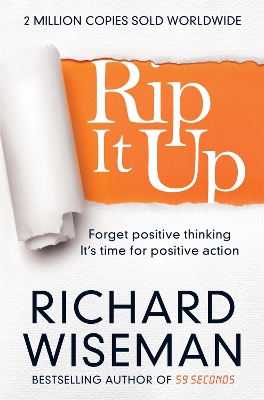
Rinn
I was sent this book, plus a copy to give away to one reader, by the publisher (Pan MacMillan) in exchange for an honest review.
I don't know a thing about psychology. Or rather, I didn't before reading this book. Richard Wiseman sets out to write a new type of self-help book, and although I have never read any before so have nothing to compare it against, I really did enjoy this one.
The basic premise is that you read through each chapter, which sets up each task in the book, and complete various tasks as you go through. Many of the tasks involve - as the title suggests - ripping pages out of the book, writing on the book; this is something that many readers will be quite uncomfortable with.
But the brilliant thing is, that's the whole point. Wiseman wants to lure people out of their comfort zones, encourage them to act in ways that they wouldn't, which in turn enforces his 'As If' method. He states that it is not the way that we think through which we can change ourselves, but the way that we act. Want to be more confident? But on a brave face and soon you will find yourself feeling a lot better for it.
Whilst some of these ideas are a lot easier said than done - if it was that simple, no-one would have reason to be shy - he brings up some very interesting theories and I really believe that if you keep trying them out, there's no reason why you couldn't make yourself more confident, or increase your self-control, or become a more organised person. I have used this sort of technique before when talking to large groups (or even small groups, I'm quite the introvert). I often find that if I go up there thinking in a confident manner, I develop that confident manner.
Don't be put off by the label of a 'self-help' book. I was actually more interested in the psychology side, something that Wiseman really provides. He wrotes about so many past experiments and theories, and there's a lot about the history of social psychology - to me, it was all so fascinating. It is also written in a way that is completely accessible to someone - like myself - who has never studied psychology in any way. His historical anecdotes go all the way from ancient Greece and Rome to modern day experiments. The history lessons also set up the experiments and tasks for the reader to complete very nicely.
As for the tasks themselves, I was expecting more when I started the book - there seems to be a larger concentration in the last few sections. The variety is great, from basic surveys and pages asking you to pick out adjectives to describe yourself, to asking the reader to deface a photograph of the author's grandfather (yes, really!).
The section on attraction was fascinating - I think I'm going to have to try and use it to my advantage! Another part that really amazed me was a story of a patient with Urbach-Wiethe disease, a condition that causes that part of the brain central to emotional experiences, particularly fear, to deteriorate. There was also a really interesting study on how the appearance of avatars in online games might cause people to perceive themselves (perfect for people like me!).
I would have loved to have read more on how dancing can make people happier than any other exercise, as it is something I really enjoy - and actually started doing when I was going through a hard time, because it made me feel so much better. I'm also a bit skeptical about the idea for helping depression - a sort of think positively, and you'll feel positive idea - because having gone through it myself, I don't think it's that simple.
The interactiveness of the book, combined with the easy to read writing style and occasional humour really makes this one a great read, whether you're looking for some 'self-help' or not. If you'd like to learn a little more about social psychology, especially if you know nothing of the subject, I would also highly recommend this book.
This review is also posted on my book blog, Rinn Reads.
